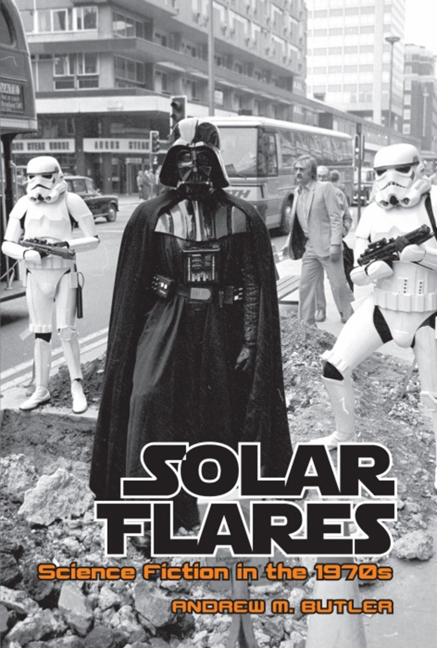Book contents
- Frontmatter
- Dedication
- Contents
- Acknowledgements
- Prologue
- 1 The Ends of First Sf: Pioneers as Veterans
- 2 After the New Wave: After Science Fiction?
- 3 Beyond Apollo: Space Fictions after the Moon Landing
- 4 Big Dumb Objects: Science Fiction as Self-Parody
- 5 The Rise of Fantasy: Swords and Planets
- 6 Home of the Extraterrestrial Brothers: Race and African American Science Fiction
- 7 Alien Invaders: Vietnam and the Counterculture
- 8 This Septic Isle: Post-Imperial Melancholy
- 9 Foul Contagion Spread: Ecology and Environmentalism
- 10 Female Counter-Literature: Feminism
- 11 Strange Bedfellows: Gay Liberation
- 12 Saving the Family? Children's Fiction
- 13 Eating the Audience: Blockbusters
- 14 Chariots of the Gods: Pseudoscience and Parental Fears
- 15 Towers of Babel: The Architecture of Sf
- 16 Ruptures: Metafiction and Postmodernism
- Epilogue
- Bibliography
- Index
2 - After the New Wave: After Science Fiction?
- Frontmatter
- Dedication
- Contents
- Acknowledgements
- Prologue
- 1 The Ends of First Sf: Pioneers as Veterans
- 2 After the New Wave: After Science Fiction?
- 3 Beyond Apollo: Space Fictions after the Moon Landing
- 4 Big Dumb Objects: Science Fiction as Self-Parody
- 5 The Rise of Fantasy: Swords and Planets
- 6 Home of the Extraterrestrial Brothers: Race and African American Science Fiction
- 7 Alien Invaders: Vietnam and the Counterculture
- 8 This Septic Isle: Post-Imperial Melancholy
- 9 Foul Contagion Spread: Ecology and Environmentalism
- 10 Female Counter-Literature: Feminism
- 11 Strange Bedfellows: Gay Liberation
- 12 Saving the Family? Children's Fiction
- 13 Eating the Audience: Blockbusters
- 14 Chariots of the Gods: Pseudoscience and Parental Fears
- 15 Towers of Babel: The Architecture of Sf
- 16 Ruptures: Metafiction and Postmodernism
- Epilogue
- Bibliography
- Index
Summary
The sf writers who started publishing in the 1950s and 1960s pushed at the boundaries of subject matter and style within the genre, at a time when taboos were being loosened. In Britain, Michael Moorcock, who took over the editing of New Worlds in 1964, encouraged his contributors to experiment with both content and form. But falling sales saw it move from magazine to paperback format – after issue 200 (April 1970) and a subscribers-only issue (March 1971), both edited by Charles Platt,New Worlds became New Worlds Quarterly. Only six issues were produced by Moorcock between 1971 and 1973, with Platt co-editor of New Worlds 6 (1973). Hilary Bailey and Platt edited New Worlds 7 (1974) and Bailey New Worlds 8 (1975), New Worlds 9 (1975) and New Worlds 10 (1976). Three issues appeared in 1978, with two more in 1979. The title was then dormant until David S. Garnett resurrected it in 1991.
But it would be as misleading to centre the New Wave on New Worlds alone as it would be to spread the term out to cover everything other than hard science fiction or First sf. In the US, Harlan Ellison edited Dangerous Visions (1967) and Again, Dangerous Visions (1972), which offered more liberal attitudes to sex, religion and narrative experimentation than most of the magazines. A third volume, The Last Dangerous Visions, was announced, which was to have included stories by almost all the other active sf authors from the period, but this has yet to appear. Ellison admitted, ‘It was just my luck that I was the guy in America and Mike Moorcock was the guy over here […] I like stirring things up’ (Fowler 1976: 17). Others were also at work: Frederik Pohl's magazine Worlds of If, which he edited from 1961 to 1969, was also open to more adult fare, as was The Magazine of Fantasy and Science Fiction (1949–). There were also various original anthologies: New Writings in SF (1964–77) edited by John Carnell to 1972 and thereafter by Kenneth Bulmer; Orbit (1966–80) edited by Damon Knight; Quark (1970–71) edited by Samuel R. Delany and Marilyn Hacker; Universe (1971–87) edited by Terry Carr; and New Dimensions (1971–80) edited by Robert Silverberg. In general, the paperback rather than the magazine was becoming the place of first publication, and paperbacks were more liberal than the sf pulps.
- Type
- Chapter
- Information
- Solar FlaresScience Fiction in the 1970s, pp. 24 - 37Publisher: Liverpool University PressPrint publication year: 2012



